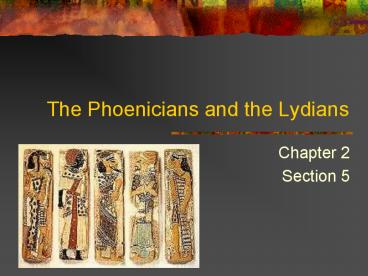The Phoenicians and the Lydians - PowerPoint PPT Presentation
1 / 16
Title:
The Phoenicians and the Lydians
Description:
Chapter 2 Section 5 Phoenicians Loose union of city-states Sea was vital for trade Little fertile land Surrounding mountains made travel difficult Very skilled ... – PowerPoint PPT presentation
Number of Views:690
Avg rating:3.0/5.0
Title: The Phoenicians and the Lydians
1
The Phoenicians and the Lydians
- Chapter 2
- Section 5
2
Phoenicians
- Loose union of city-states
- Sea was vital for trade
- Little fertile land
- Surrounding mountains made travel difficult
- Very skilled sailors
- One of the greatest traders in the ancient world
- Lumber
- Metals
- Gold and silver
- Murex- shellfish used to make a purple dye
3
Phoenicians
- Peaked around 1000 B.C.
- Culture
- Very similar to Babylonians and Egyptians
- Religion
- Very focused on winning the favor of the gods
- In some cases, children were sacrificed
- Usually following natural disasters
- Writing
- Phoencian Alphabet- became the model for Western
alphabets
4
Phoenicians
- Never established a major empire, but the
Phoenician alphabet was a major contribution - Greeks and Romans adopted the alphabet
- Conquered by the Assyrians
5
Lydians
- Peaked around 600 B.C.
- Makes up what is today the Asia Minor
(present-day Turkey) - Major contribution coined money
- Why was this so important?
- No longer had to rely on bartering for trade
- Their development of a money economy spread
across the ancient world
6
The Origins of Judaism
- Chapter 2
- Section 6
7
Hebrews
- Ancestors of the modern Jews
- Inhabited Canaan
- Small strip of land south of Phoenicia
- See map on p. 41
- Abraham
- Founder of the Hebrew people
- Jacob
- Grandson of Abraham
- Had 12 sons
- Each established a tribe
- Twelve Tribes of Israel
8
Exodus
- Due to droughts, the Hebrews left Canaan and
traveled to Egypt - Lived peacefully in Egypt for some time
- Eventually fell out of favor of the Egyptians
- Why?
- Most scholars believe that the Hebrews may have
come to Egypt with the Hyksos - When the Egyptians expelled the Hyksos in 1200
B.C., they held the Hebrews as slaves
9
Exodus
- Hebrews held as slaves for over 400 years
- Moses
- Led the Hebrews from slavery (Exodus)
- Led the Hebrews into the desserts of the Sinai
Peninsula - The Ten Commandments
- Moses climbed to the top of Mt. Sinai and
returned with tablets containing the commandments - Inspired, Moses set out to claim Canaan
10
Activity
- Read the Ten Commandments on p. 45
- Write a response to each commandment explaining
why the rule would help to preserve the Hebrew
community - Use complete sentences
- 10 pts.
- Hint Covet desiring goods belonging to others
11
Founding of Israel
- Resistance in Canaan
- Canaanites in the north
- Conquered by the Hebrews
- Philistines in the south
- Driven out by the Hebrews, but never fully
conquered - During the fighting, the 12 Tribes united under a
single kingdom- Israel - Saul ? 1st king
- David ? succeeded Saul and made Jerusalem a
religious center - Solomon? brought Israel to its height in wealth
in power
12
Divided Kingdom
- After Solomons death in the late 900s B.C., the
kingdom divided due to struggles for political
power - Northern tribes formed the kingdom of Israel
- Southern tribes formed the kingdom of Judah
- Lacking unity and strength, the two kingdoms were
conquered - 722 B.C.? Assyrians conquered Israel
- 587 B.C. ? Chaldeans conquered Judah
13
Freedom
- When Cyrus the Great of Persia conquered the
Chaldeans, he allowed the Hebrews to return to
their homeland - The Hebrews rebuilt Jerusalem
- Torah- The first 5 books of the Old Testament
- Includes the Hebrew code of Laws
14
Judaism
- Yahweh ? Hebrew God
- Spiritual force, not a glorified human or nature
- Political rulers had no claims to divinity
- According to the Ten Commandments, only Yahweh is
divine - Monotheistic
- Ethical monotheism
- Emphasizes ethics, or proper conduct
- Carried over to the founding of Christianity
- Judeo-Christian ethics ? similar values
- One of the most important contributions to
Western civilization
15
Dead Sea Scrolls
- Ancient manuscripts
- Date back to the 100s B.C.
- Detailing the history and principles of Judaism
16
Activity/HW
- Section 6 Review
- P. 47
- 3
- 4 c and d only
- Ch. 2 Review
- P. 48
- Writing About History
- ONLY COMPLETE THE CHART
- DO NOT WRITE A REPORT
- Unless you want to )































